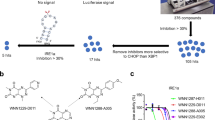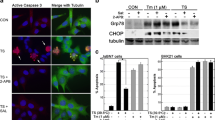Abstract
By environmental stresses, cells can initiate a signaling pathway in which eukaryotic translation initiation factor 2-alpha (eIF2-α) is involved to regulate the response. Phosphorylation of eIF2-α results in the reduction of overall protein neogenesis, which allows cells to conserve resources and to reprogram energy usage for effective stress control. To investigate the role of eIF2-α in cell stress responses, we conducted a viability-based compound screen under endoplasmic reticulum (ER) stress condition, and identified 1-(4-biphenylylcarbonyl)-4-(5-bromo-2-methoxybenzyl) piperazine oxalate (AMC-01) and its derivatives as eIF2-α-inactivating chemical. Molecular characterization of this signaling pathway revealed that AMC-01 induced inactivation of eIF2-α by phosphorylating serine residue 51 in a dose- and time-dependent manner, while the negative control compounds did not affect eIF2-α phosphorylation. In contrast with ER stress induction by thapsigargin, phosphorylation of eIF2-α persisted for the duration of incubation with AMC-01. By pathway analysis, AMC-01 clearly induced the activation of protein kinase RNA-activated (PKR) kinase and nuclear factor-κB (NF-κB), whereas it did not modulate the activity of PERK or heme-regulated inhibitor (HRI). Finally, we could detect a lower protein translation rate in cells incubated with AMC-01, establishing AMC-01 as a potent chemical probe that can regulate eIF2-α activity. We suggest from these data that AMC-01 and its derivative compounds can be used as chemical probes in future studies of the role of eIF2-α in protein synthesis-related cell physiology.






Similar content being viewed by others
References
Balachandran S, Barber GN (2004) Defective translational control facilitates vesicular stomatitis virus oncolysis. Cancer Cell 5:51–65
Boyce M et al (2005) A selective inhibitor of eIF2alpha dephosphorylation protects cells from ER stress. Science 307:935–939. doi:10.1126/science.1101902
Chappell SA et al (2000) A mutation in the c-myc-IRES leads to enhanced internal ribosome entry in multiple myeloma: a novel mechanism of oncogene de-regulation. Oncogene 19:4437–4440. doi:10.1038/sj.onc.1203791
Deval C et al (2009) Amino acid limitation regulates the expression of genes involved in several specific biological processes through GCN2-dependent and GCN2-independent pathways. FEBS J 276:707–718. doi:10.1111/j.1742-4658.2008.06818.x
Donnelly N, Gorman AM, Gupta S, Samali A (2013) The eIF2alpha kinases: their structures and functions. Cell Mol Life Sci 70:3493–3511. doi:10.1007/s00018-012-1252-6
Fritsch RM, Schneider G, Saur D, Scheibel M, Schmid RM (2007) Translational repression of MCL-1 couples stress-induced eIF2 alpha phosphorylation to mitochondrial apoptosis initiation. J Biol Chem 282:22551–22562. doi:10.1074/jbc.M702673200
Galluzzi L, Brenner C, Morselli E, Touat Z, Kroemer G (2008) Viral control of mitochondrial apoptosis. PLoS Pathog 4:e1000018. doi:10.1371/journal.ppat.1000018
Gil J, Alcami J, Esteban M (2000) Activation of NF-kappa B by the dsRNA-dependent protein kinase. PKR involves the I kappa B kinase complex. Oncogene 19:1369–1378. doi:10.1038/sj.onc.1203448
Han AP et al (2001) Heme-regulated eIF2alpha kinase (HRI) is required for translational regulation and survival of erythroid precursors in iron deficiency. EMBO J 20:6909–6918. doi:10.1093/emboj/20.23.6909
Harding HP, Zhang Y, Ron D (1999) Protein translation and folding are coupled by an endoplasmic-reticulum-resident kinase. Nature 397:271–274. doi:10.1038/16729
Healy SJ, Gorman AM, Mousavi-Shafaei P, Gupta S, Samali A (2009) Targeting the endoplasmic reticulum-stress response as an anticancer strategy. Eur J Pharmacol 625:234–246. doi:10.1016/j.ejphar.2009.06.064
Hinnebusch AG (2012) Translational homeostasis via eIF4E and 4E-BP1. Mol Cell 46:717–719. doi:10.1016/j.molcel.2012.06.001
Holcik M, Sonenberg N (2005) Translational control in stress and apoptosis. Nat Rev Mol Cell Biol 6:318–327. doi:10.1038/nrm1618
Ito T, Yang M, May WS (1999) RAX, a cellular activator for double-stranded RNA-dependent protein kinase during stress signaling. J Biol Chem 274:15427–15432
Jiang HY, Wek RC (2005) GCN2 phosphorylation of eIF2alpha activates NF-kappaB in response to UV irradiation. Biochem J 385:371–380. doi:10.1042/BJ20041164
Kim I et al (2009) Chemical biology investigation of cell death pathways activated by endoplasmic reticulum stress reveals cytoprotective modulators of ASK1. J Biol Chem 284:1593–1603. doi:10.1074/jbc.M807308200
Koromilas AE (2015) Roles of the translation initiation factor eIF2alpha serine 51 phosphorylation in cancer formation and treatment. Biochim Biophys Acta 1849:871–880. doi:10.1016/j.bbagrm.2014.12.007
Lee do Y et al (2010) Activation of PERK signaling attenuates Abeta-mediated ER stress. PLoS One 5:10.1371/journal.pone.0010489
Ling J, Morley SJ, Traugh JA (2005) Inhibition of cap-dependent translation via phosphorylation of eIF4G by protein kinase Pak2. EMBO J 24:4094–4105. doi:10.1038/sj.emboj.7600868
Nakamura T et al (2010) Double-stranded RNA-dependent protein kinase links pathogen sensing with stress and metabolic homeostasis. Cell 140:338–348. doi:10.1016/j.cell.2010.01.001
Onuki R et al (2004) An RNA-dependent protein kinase is involved in tunicamycin-induced apoptosis and Alzheimer's disease. EMBO J 23:959–968. doi:10.1038/sj.emboj.7600049
Pannevis MC, Houlihan DF (1992) The energetic cost of protein synthesis in isolated hepatocytes of rainbow trout (Oncorhynchus mykiss) Journal of comparative physiology B. Biochem, Syst, Environ Physiol 162:393–400
Ruvolo PP, Gao F, Blalock WL, Deng X, May WS (2001) Ceramide regulates protein synthesis by a novel mechanism involving the cellular PKR activator RAX. J Biol Chem 276:11754–11758. doi:10.1074/jbc.M011400200
Schroder M, Kaufman RJ (2005) The mammalian unfolded protein response. Annu Rev Biochem 74:739–789. doi:10.1146/annurev.biochem.73.011303.074134
Silvera D, Formenti SC, Schneider RJ (2010) Translational control in cancer nature reviews. Cancer 10:254–266. doi:10.1038/nrc2824
Sonenberg N, Hinnebusch AG (2009) Regulation of translation initiation in eukaryotes: mechanisms and biological targets. Cell 136:731–745. doi:10.1016/j.cell.2009.01.042
Stockwell SR et al (2012) Mechanism-based screen for G1/S checkpoint activators identifies a selective activator of EIF2AK3/PERK signalling. PLoS One 7:e28568. doi:10.1371/journal.pone.0028568
Szegezdi E, Logue SE, Gorman AM, Samali A (2006) Mediators of endoplasmic reticulum stress-induced apoptosis. EMBO Rep 7:880–885. doi:10.1038/sj.embor.7400779
Tabas I, Ron D (2011) Integrating the mechanisms of apoptosis induced by endoplasmic reticulum stress. Nat Cell Biol 13:184–190. doi:10.1038/ncb0311-184
Wang M, Kaufman RJ (2014) The impact of the endoplasmic reticulum protein-folding environment on cancer development. Nat Rev Cancer 14:581–597. doi:10.1038/nrc3800
Wieser W, Krumschnabel G (2001) Hierarchies of ATP-consuming processes: direct compared with indirect measurements, and comparative aspects. Biochem J 355:389–395
Zamanian-Daryoush M, Mogensen TH, DiDonato JA, Williams BR (2000) NF-kappaB activation by double-stranded-RNA-activated protein kinase (PKR) is mediated through NF-kappaB-inducing kinase and IkappaB kinase. Mol Cell Biol 20:1278–1290
Acknowledgments
This study was supported by a new scientist research grant from the National Research Foundation of Korea (NRF-2014R1A1A1003831 to KIK), which is funded by the Ministry of Science, ICT, and Future Planning of Korea.
Author information
Authors and Affiliations
Corresponding author
Ethics declarations
Conflicts of interest
The authors declare that they have no competing interests.
Rights and permissions
About this article
Cite this article
Hong, MN., Nam, KY., Kim, K.K. et al. The small molecule ‘1-(4-biphenylylcarbonyl)-4-(5-bromo-2-methoxybenzyl) piperazine oxalate’ and its derivatives regulate global protein synthesis by inactivating eukaryotic translation initiation factor 2-alpha. Cell Stress and Chaperones 21, 485–497 (2016). https://doi.org/10.1007/s12192-016-0677-5
Received:
Revised:
Accepted:
Published:
Issue Date:
DOI: https://doi.org/10.1007/s12192-016-0677-5




